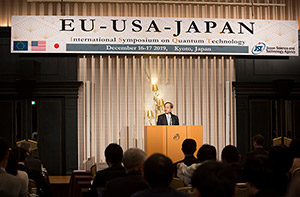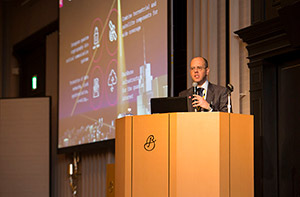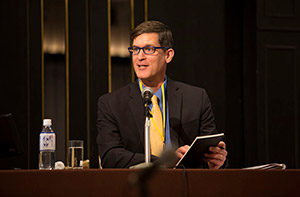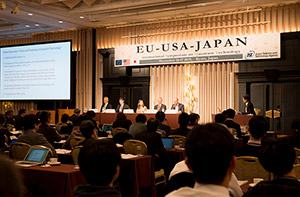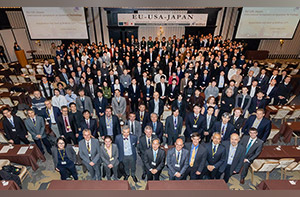News & Topics
EU-USA-Japan International Symposium on Quantum Technology
To expand international cooperation in quantum science and technology
December 26, 2019
Strategic Basic Research Programs/CREST
https://www.jst.go.jp/kisoken/crest/en/research_area/ongoing/bunyah28-2.html
EU-USA-Japan International Symposium on Quantum Technology (ISQT) was held on the 16th and 17th of December, 2019 at Kyoto Brighton Hotel in Kyoto, aiming at further expansion of international cooperation and advancement of quantum science and technology among Europe, the USA, and Japan.
Since 2016, JST has been supporting the research area “Creation of an innovative quantum technology platform based on the advanced control of quantum states” in the CREST program to develop a frontier in quantum science and create an innovative quantum technology platform for the advancement of society. Since this research area aims to improve the research capability of Japan, as well as to promote the expansion of international cooperation, we held the Japan-EU Joint Workshop on Advanced Quantum Technology for Future Innovation in September 2018 in Paris, co-chaired by Arakawa Yasuhiko, Research Supervisor of CREST program. The participants, including researchers and related policymakers, discussed promising quantum research areas and its implementation measures for their collaboration.
For this second international symposium followed by the last Japan-EU workshop, we invited researchers and policymakers from the USA as well. The guest speakers from the three regions introduced various initiatives for quantum technology policies and latest research trends in quantum computing, quantum communication, quantum metrology and sensing, etc. From students to leading researchers in quantum research, a total of 348 participants (including pre-registers and invited speakers) from ten countries/regions gathered and actively engaged in discussions beyond the boundaries of each research community.
In the last part of the symposium, a panel discussion titled “Policy and Roadmap of Quantum Technology” was held. Representatives from Europe, the USA, and Japan exchanged opinions about strategies for academic development of quantum science and the expected contribution of quantum science and technology to social development in addition to introducing trends and prospects of their own research area. Particularly, the discussion on academic development in quantum science revealed that there are common issues and challenges regardless of regions, including fostering young researchers and collaboration with other areas, expansion of not only developers but also users of the technology, importance of enhancing fundamental research, etc.
In the closing remarks by co-chairs of three regions, the symposium was confirmed as a starting point for deepening cooperation in the quantum science and technology discipline among Europe, the USA, and Japan and their expectations for further collaboration were presented followed by their appreciations to the exciting presentations. The hall was filled with participants' aspirations of stepping into a new stage that realizes academic and social development of quantum technology led by collaboration and competition among Europe, the USA, and Japan.
The discussion results of the symposium summarized by the co-chairs are admitted as one of outcomes toward specific measures of the international strategy of “Quantum Technology and Innovation Strategy” formulated mainly by the Cabinet Office.
- Discussion Results of EU-USA-Japan International Symposium on Quantum Technology (Summary) presented by the Cabinet Office
- https://www8.cao.go.jp/cstp/stmain/191217tougikekka.pdf
